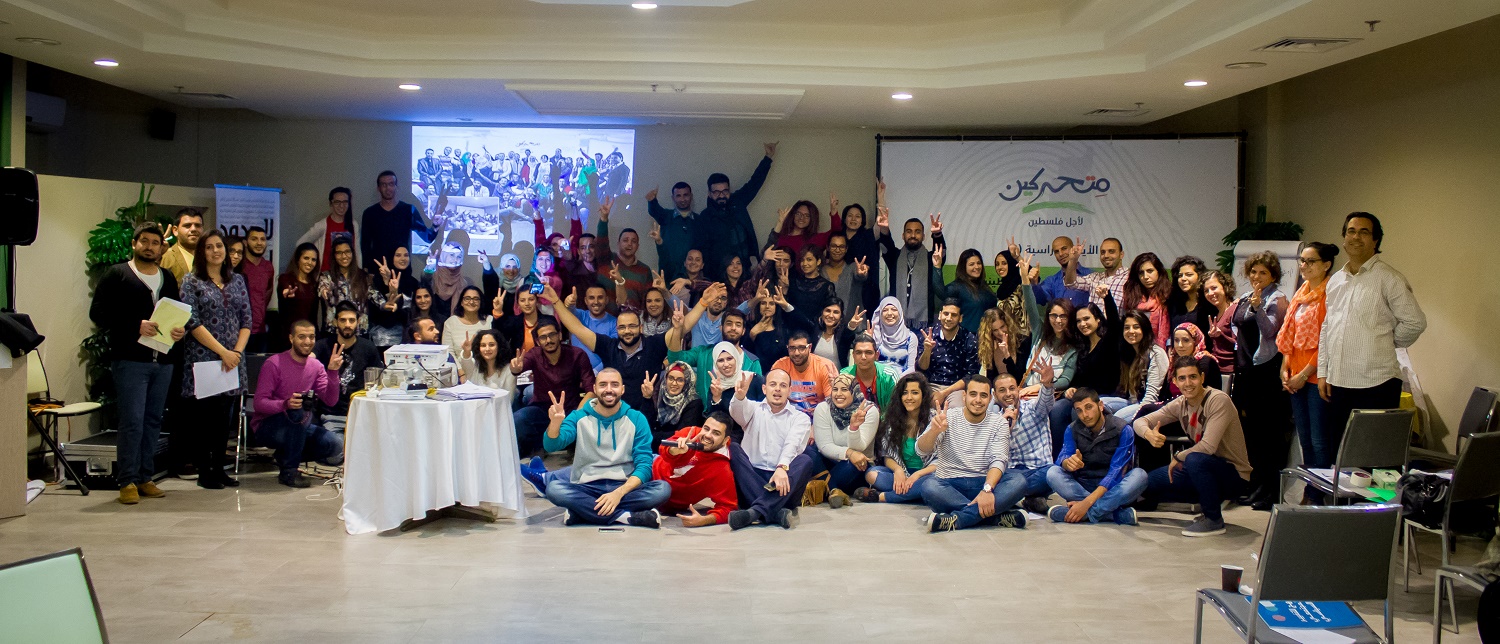
(Above photo: "Together despite Occupation and borders": This picture reflects how Palestinian youth challenge Occupation by overcoming geographic separation, political, and social fragmentation.)
Note: Nur Abdi is the Manager of AFSC’s Palestine program, including Palestinian Youth Together for Change, which facilitates gatherings of youth from all parts of Palestine. Nur was born and raised in Akka, received a BA in sociology from Birzeit University, and currently lives with his wife and son Naji. You can read more about a Palestine Youth Together for Change gathering that occurred in Jericho in spring 2015 here. The following is edited excerpts of our conversation. – Genevieve Beck-Roe
Genevieve Beck-Roe (GBR): Can you tell me about AFSC's Palestine program and its focus within Palestine?
Nur Abdi (NA): The priority of the Palestine program is confronting the fragmentation imposed by the occupation/the state of Israel. This includes challenging the militarized society of Israel and supporting non-violence and social change efforts. The main work of the program is facilitating increased cohesion across Palestinian communities in different locations.
On Fragmentation
GBR: What you mean by “Palestinian social fragmentation,” and why is it important to address?
NA: It’s not just social fragmentation, we’re talking about Palestinian fragmentation in general i.e. political, cultural, ideological, etc. Israel through its occupation of Palestinian territories has implemented a separation policy that is maintained to keep Palestinians divided from themselves and from their lands. This separation policy separates the one space into three: The West Bank, Gaza, and Palestinians inside Israel. Communities are cut off, and Palestinians are kept away from each other. Palestinians within these localities are treated as separate from one another. Palestinians inside Israel become Israelis, Gazans in Gaza and those within the West Bank become West Bankers. Even within the West Bank there is a separation policy between Jerusalem (part of the West Bank annexed illegally by Israel in 1967) and the other parts of the West Bank.
The separation is maintained through different identification cards (IDs) corresponding to where you live which affect your rights but also your aspirations. The separation cuts us and divides us into groups and each group has a different legal status and different frameworks that affect daily life and also affect the national aspect of Palestinians. The whole concept of linking rights to IDs is about ethnic cleansing, is like a pogrom.
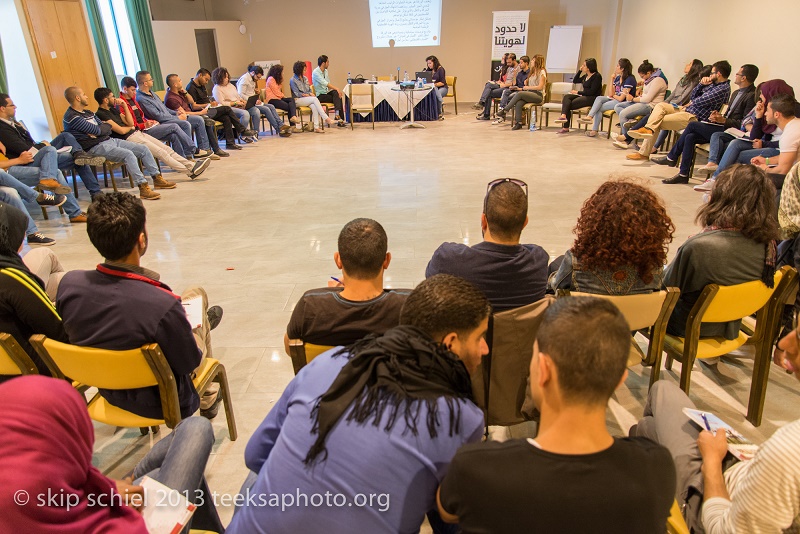
On love across the wall
GBR: Can you tell me a story that illustrates the impact of Palestinian fragmentation?
NA: I always say that the greatest example of fragmentation has to do with love. Meaning that, as a Palestinian, you can't fall in love. It's forbidden for you. You can’t fall in love, unfortunately you have to plan your love.
I can give an example of two of our Palestinian Youth Together for Change youth participating in one of our main projects. Majed is a Palestinian in the West Bank, and Samar is a Palestinian in Gaza. They fell in love, as simple as that. They interacted with each other while working on the project. Now they are engaged.
The issue is: Are they allowed to live together or not? The fragmentation is on that level, meaning they can't live together because to move from Gaza to the West Bank you need a special permit from the Israeli occupation forces. The Occupation decides for you whether you can sleep in the same room or not. You have to plan your love, and you have to think, "Okay, so if I fall in love with a Palestinian from Gaza, can I sleep with her in the same room or not? Or will we be in love through Facebook and technology?” This is the fragmentation that we are talking about.
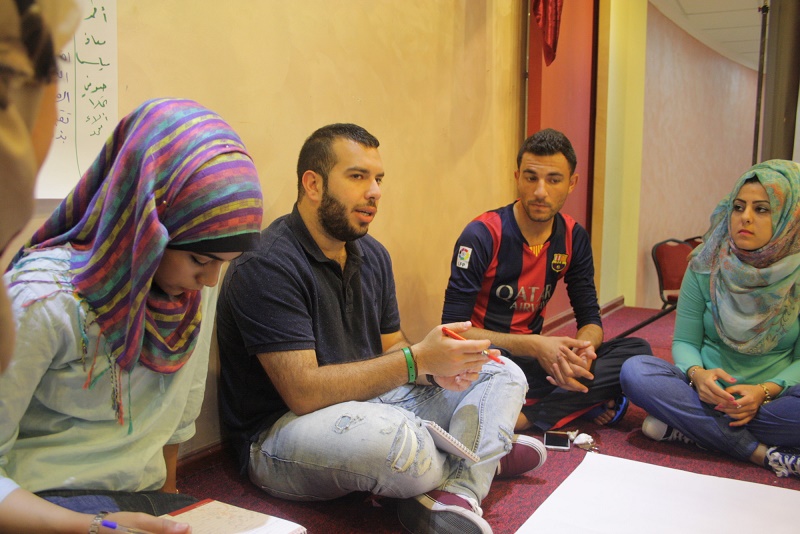
Bringing Palestinian youth together
GBR: How does your work bringing Palestinian youth together impact those who participate?
NA: I’ll give you an example. Khalil is a Palestinian Israeli, and he participated in a meeting where we managed to bring all Palestinians from the different three localities together. He said that, before, his dream was always to visit Lebanon, because as a Palestinian within Israel he can't visit Lebanon. But after participating he said, "Now I want to know more about my brothers and sisters in Gaza." His priority became knowing one another within Palestine, instead of knowing Palestinians outside of Palestine.
GBR: I’ve heard “normalization” being a criticism of some work that is being done in Israel and Palestine. How do you define “normalization,” and why does AFSC resist normalizing practices?
NA: Normalization is when you bring Israelis and Palestinians together to encounter one another, but don't acknowledge the power differential within the Occupation: that Jewish Israelis will likely become soldiers and Palestinians will be policed by them. People act as though things are normal, when they are profoundly inequitable.
The normalizing work that is being done is focused on the meeting of Israelis and Palestinians more than the injustices of the Occupation. I think it's a very sensitive thing but if you want to make it simple it's about contact and content. What has been happening so far it just contact, bringing Palestinians and Israelis together. There is no content.
We believe the content must be addressing the roots of the Occupation and all its structures of oppression and not to normalize the Occupation, which is what is happening. Bringing Israelis and Palestinians together is not enough. Are we going to address the roots of the oppression and the Occupation, or do we just want to sit? What has been happening so far is just sitting.
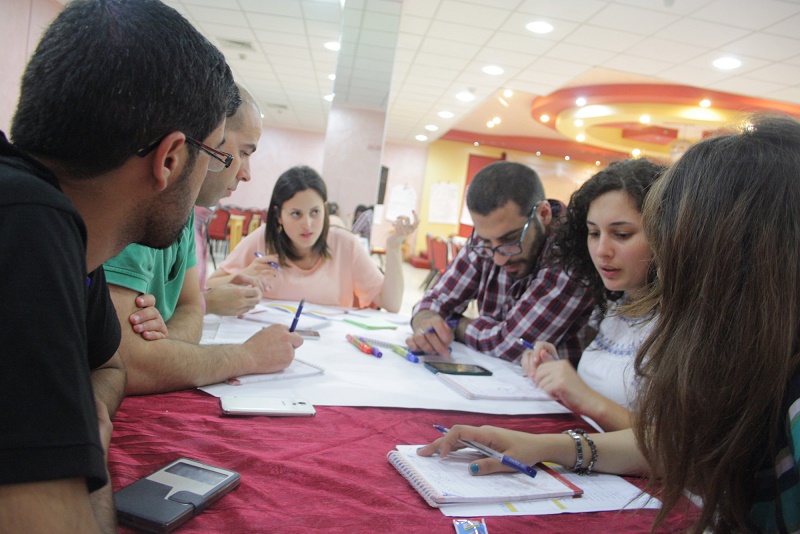
Creating a safe space for Palestinian youth
GBR: It sounds like it’s very challenging work to bring all of these youth together, and that it involves complications with checkpoints and with visas and with all of these different things. Are the challenges of bringing everyone together within the Occupation something you discuss? What do you think about it?
NA: It’s a continual dilemma. We have youth that say that you can't fight the master with the master's tools. We have to apply for permits to get our youth from Gaza to the West Bank to meet together, and some of the youth say we shouldn’t apply for those permits. We have youth that don't agree with us.
We are not so happy with what we have to do to get there, but the impact that bringing the youth together is huge and it's worth it. It's a dilemma, yes. We always talk about it and we always think about what we are doing.
GBR: How do the Quaker values of AFSC shape your approach to your work?
NA: Quaker values gives the approach that we should be as inclusive as we can be. We want to be open to including a diverse group of youth. We facilitate a safe space for them to come together and express themselves freely, without judgment. We also focus on the dignity of the youth. As AFSC, we don't come and tell the youth what do to, we just help in creating the safe space for them.
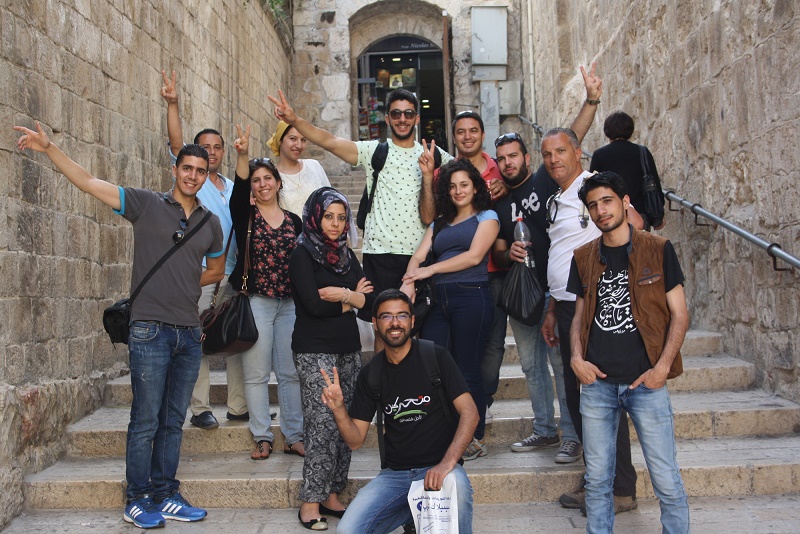
We are we
GBR: What do you hope the Palestine Youth Together for Change project will lead to in the future?
NA: I hope it will continue to be a safe space for the youth where they can interact and understand each other more, and that in that space they will not let the Occupation define who they are towards one another. I want to see hundreds more youth meet each other and learn what is happening. I want it to be a turning point in their lives when they meet each other, affecting them as individuals and changing their views about each other, and as a result contributing toward a collective identity as Palestinians
What makes me happy is when one youth destroys the stereotype they hold about the other and does away with the concept of “the other.” We are not “the other," we are “we.” “Other” is what the Occupation wants: For us to be groups, and for us to be others. The Occupation develops that concept. We are here to break the whole concept of “the other." We are not others, we are one, we are we.